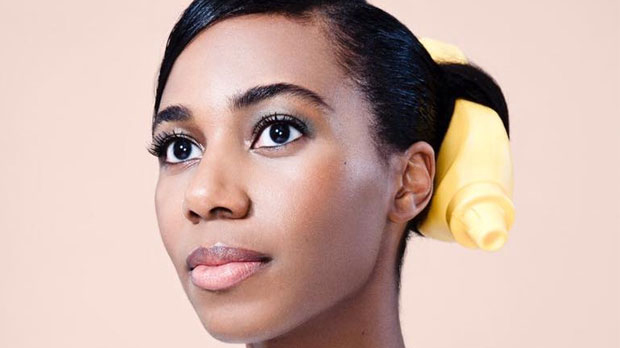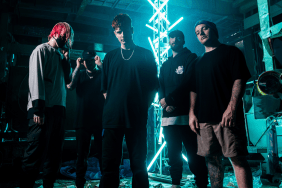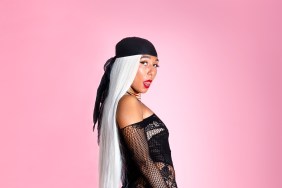Santi “Santigold” White is dropping her third album, 99¢, which, aptly for a hyper-hybridist, is brimming with punk, New Wave, ska, electro, hip-hop, trip-hop, dancehall and trap. Imagine Rihanna joining an early incarnation of Bananarama – or, on the darker numbers, Neneh Cherry shadowing UNKLE. “I love Bananarama!,” enthuses a friendly White.
Ironically, 99¢ is White’s most focussed project – musically and thematically. It’s a socio-political Warholian concept album about how increasingly we package, brand and commodify ourselves. The first single, Can’t Get Enough Of Myself, featuring BC, is a (sarcastic) anthem for the Insty generation. 99¢’s cover image, by photographer Haruhiko Kawaguchi, shows White vacuum-sealed with her ‘stuff’.
The Philadelphian was working in A&R for Epic Records when she started writing alt ‘n’ B with Res. A New Wave fan, White would likewise front the punk band Stiffed. The singer/songwriter eventually introduced her solo guise, Santogold, attracting comparisons to MIA (she did record with Diplo and Switch) and being miscast as an ‘urban’ act. Today 2008’s Santogold is considered a watershed for overground pop, with such classic singles as Creator and LES Artistes. White has continued to write for others – including Christina Aguilera. She aligned herself with Roc Nation – providing the hook on Jay Z’s Kanye West-helmed Brooklyn Go Hard. After modifying her monicker to ‘Santigold’ due to legal matters, White last issued 2012’s Master Of My Make-Believe – home to Disparate Youth.
White has since taken time out from music. She cameoed in TV’s The Office. Then this “style influencer” put her name to designer socks (!) for Stance and a Smashbox Cosmetics collection. And White, who lives with her Canadian husband Trevor Andrew, a pro snowboarder (and sometime muso), in Brooklyn, New York, had a son, Radek. Still, she cut vocals for A$AP Rocky’s Long. Live. A$AP. 99¢ sees White reunite with old collaborators – like John Hill and, from TV On The Radio, Dave Sitek. But she’s also newly connected with Yeezy affiliate Hit-Boy and, from the Mad Decent universe, Canadian bass duo Zeds Dead.
https://www.youtube.com/watch?v=Bi171sZUQUA
Music Feeds: 99¢ is a commentary on consumer culture and imaging. But I didn’t get the vibe that you’re necessarily ambivalent about that. You seem to accept the state of play. Have I got that right?
Santigold: No, you don’t have it right, but you almost have it right! You’re kind of right. The thing that you said wrong is that you can’t tell that I’m ambivalent about it. I’m totally ambivalent about it. I embrace it, though – you’re right about that. But the record’s really about how ambivalent I am about it and how much I struggle with it. As an artist, it’s really hard to be yourself as a product and just be ‘on’ all the time – to have this false reality of perfection and selling yourself, selling yourself, selling yourself.
That’s what inspired me to even write this record with these topics, because it’s an absurd reality. I really do find fault with it. But, at the same time, what’s even stranger is that, if I wanna make a living as an artist, I have to play the game and I have to do these things. So, basically, without being preachy, what I decided to do was turn the reality into my art – [that’s] what pop art is, you take what it is and you just hold it to people’s faces, almost like you hold a mirror to [the] culture and say, ‘Look, everyone, look how crazy and absurd this reality is. Why don’t you take a moment to reflect on it – because do you think this is cool?’
For example – if that was confusing – if I wanna make videos, I don’t get enough money from my label to make videos, right? So I have to go and raise money to make every single video – and I have to get money from brands. And then, when you get money from brands, you have to put their products in your videos. So you end up having these weird products in your videos that you have to showcase. Most times you try to do it in the most subtle way possible, but this time I’ve done it in the most absolutely blatant way possible, so it seems like there’s a commercial in the video (laughs). That’s what the art is.
So I’ve basically taken these strange cultural phenomenon of like, selling, selling, selling and just put it right in your face and made that part of my art in order to comment on it. If you go on my website, I’ve made all these satirical fake infomercials, so you have the experience of having to fight through all this stuff – selling, selling, selling – just to get to the music. I’m making art out of the experience.
MF: Artists talk of having a ‘brand’ now – without irony. Do you notice slippage between how you perceive your brand as ‘Santigold’ and how the public and the media see it? Or do they equate?
SG: You know, I keep being asked what my brand is and I’ve not yet come up with a good answer! But intrinsically I do know what it is and I think that to me my brand is art. I think I’m known for making real art and for still having integrity and quality to what I do. I think that’s what my brand is known for. I think in the media that’s what they would say I’m known for – which is great. But the selling of my brand – like, how great I do on social media or am I always poised for show? No, I’m not good at that.
I’m not good at always being my brand, ’cause I think another thing that ‘Santigold’ is about is being a real person – and that part and being a brand don’t always go together.
MF: At the same time, other artists are often compared to you now. You’re associated with an aesthetic or even a genre. How you feel about that?
SG: I don’t really care. I think that people are always gonna do that – especially with new artists, people try to sort of give people context, give new artists context, by comparing them to other artists. I don’t pay any attention to it. People did it to me when I came out. It was really hard, actually, when I first came out, because, when you’re first coming out, you want people to kinda give you a listen with fresh ears.
Then, when you get compared to people, people kinda make preconceived notions about who you are and what you’re gonna sound like. But, by my third record, people know who I am and know what I sound like. So I don’t care. I think that’s the great thing about still being around for three records.
https://www.youtube.com/watch?v=1KhulZlP1JA
MF: Hit-Boy has a credit on 99¢, but I can’t imagine what he did! How did you go about curating the album – because that’s the other word we hear a lot now, ‘curating’?
SG: I know. In the past I’ve worked a lot with the same producers and people that I already have really close relationships with and who I kinda came up with. This record I wanted fresh energy – I wanted it to feel like a completely brand-new thing. So I tried working with all these people I’ve never worked with before. I wasn’t familiar with all of the producers – I was familiar with some of them – and some of them I just took a leap of faith and tried and was so pleasantly surprised.
I think that the variety of styles of the different producers – I mean, it makes perfect sense ’cause my music’s always like a collage and all over the place. But what was really great was that a lot of the producers that I worked with were so able to jump around in between genres with me – like [Sweden’s] Patrik Berger [Robyn, Icona Pop] and Rostam Batmanglij [ex-Vampire Weekend] and Justin Raisen [Charli XCX], they just came with, like, punk-rock and old school reggae and then were totally psyched to make pop music, but put some African [influence] in it… We were just playing – and we were playing in genres. They really were able to hang in there with me.
HazeBanga [MIA] and Hit-Boy gave me a song [Big Boss Big Time Business] that didn’t sound anything like the stuff you would expect from them. It was super reggae-tinged and it was a beautiful song that didn’t sound anything like a lot of the other stuff that they did. I think that the producers were really pushing themselves to step outside of the things that they have done before. It was really great.”
MF: I’ve got to ask about the Smashbox Cosmetics line… And you’ve done The Office. Do you enjoy these side activities? What purpose do they serve?
SG: I love it! I love it – and I really feel like I need to do that [kind of side activity] because, if I just did music all the time, I would be so bored, you know? I’m really an artist who loves creating. I love creating more than just music and, in order to continue to make music, I have to almost let the music part of my brain go fallow sometimes, just turn it off and let it rest and try other things and try my art across other mediums – because then it allows me to come back to music with sort of a renewed and reinvigorated spirit.
MF: Will you be touring here again soon?
SG:I really hope so! I really hope so. I love touring out there. I don’t have anything locked in yet, but I hope I do [soon].
–
’99c’ is out Februrary 26th, you can grab a copy here and read our review of it here.












